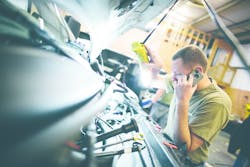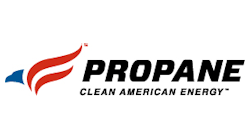There are many reasons for fleet managers and administrators to be excited about using propane autogas vehicles. Lower fuel costs, lower total cost-of-ownership over the life of the vehicle, and lower emissions — including greenhouse gases, particulate matter, SOx, and NOx — are just a few of the advantages that provide returns for budgets, operators and communities.
But there are also many reasons for maintenance technicians to get excited about propane autogas. Over time, technicians will spend less time on unexpected maintenance, which affects daily schedules and decreases productivity. Unlike gasoline and diesel, fuel leaks and spills are almost nonexistent with propane autogas, which ensures workspaces are cleaner and technicians don’t smell like conventional fuels at the end of the work day.
Introducing propane autogas vehicles into a fleet also has advantages for maintenance shops and technicians from day one because of the few, if any, garage modifications that need to be made to an existing code-compliant facility. Training technicians to maintain, diagnose and repair propane autogas fuel systems is simple, too.
Few, if Any, Changes to Maintenance Facilities
Repair and garaging facilities typically do not require costly modifications when adding propane autogas vehicles to a fleet. In fact, if existing buildings are code compliant for diesel and gasoline, typically there are no infrastructure changes required for propane autogas engines. The major areas of focus are workspace ventilation, sources of ignition, and electrical. Segregation of major and minor repairs is not required either — the same requirements as for gasoline — and diesel-fueled vehicles apply to propane autogas.
Facility managers should always check with their local authority having jurisdiction, though, which may have different codes than those set by the National Fire Protection Association, International Building Code and National Electric Code.
Plentiful Training Opportunities
Unlike diesel or compressed natural gas engines, propane autogas fuel systems are less complex and technicians are easily and conveniently trained by the OEMs or aftermarket fuel system manufacturer to maintain, diagnose and repair the engines. This was one of the primary reasons First Tennessee Human Resource Agency was able to convert its transit vans to propane autogas to better support its clients across eight of the state’s rural counties. Their OEM, Alliance Autogas, provided training to certify maintenance technicians in conversion kit installation and ongoing preventative maintenance, ensuring the department’s success with the fuel. In another instance, when Macon County Transit in North Carolina converted 13 propane autogas transit vans, ICOM provided training at a local facility.
In addition to OEM training and certification, there are a growing number of options for attaining the required technician training necessary to maintain and repair propane autogas fuel systems. In 2018, PERC will continue to sponsor free technician training opportunities through the National Alternative Fuels Training Consortium. Fleets can also work through the NAFTC network of training centers to locate available programs.
Similar to Familiar Fuel Systems
Maintenance technicians are surprised and excited when they take their first look under the hood of a propane autogas vehicle. New liquid propane fuel injection engines are similar in appearance to gasoline engines, and require similar equipment for maintenance, diagnosis and repair. For example, propane autogas’s similarity to existing fuel systems was a factor that influenced San Diego Metropolitan Transit System’s decision to transition 77 shuttle buses to the alternative fuel. Bill Spraul, the fleet’s chief operating officer, says training the fleet’s crews to operate, refuel, and maintain its vehicles required minimal efforts considering their existing level of experience.
Incorporting propane autogas into a fleet may seem like extra work for a fleet’s technicians, but that isn’t the case when the fleet chooses propane autogas.
Michael Taylor is the director of autogas business development for the Propane Education & Research Council.




